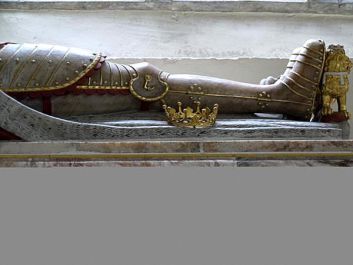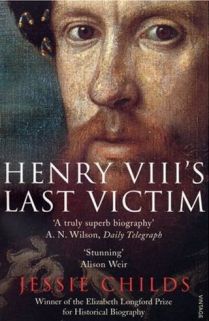Historical Profile of Henry Howard
Jump to navigation
Jump to search
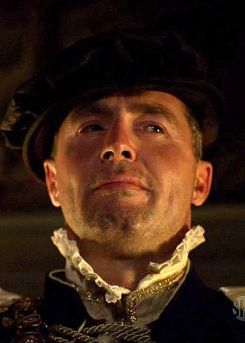 | 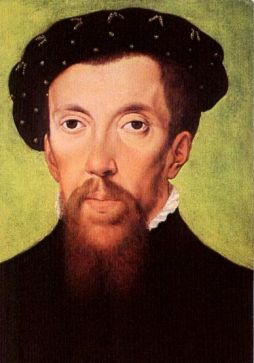 |
INTERESTING FACTS:
| 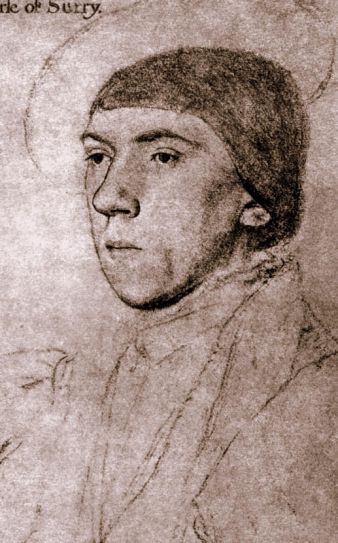 Henry Howard, Earl of Surrey in his younger years, by Hans Holbein "The Tudors were constantly on the watch that the Howards limit their ambitions to Tudor women and refrain from casting greedy eyes upon the Tudor crown. Henry Howard, first cousin to Katherine and heir to the dukedom, was relieved of his head in 1546 for having openly used, and traitorously caused to be depicted, mixed, and conjoined with his own arms and ensigns, the said arms and ensigns of the King . The heraldic pretensions of the Howard family were tantamount to an assertion that Howard blood was the equal of Tudor blood and that a Howard might yet succeed a Tudor upon the throne. The folly of young Henry Howard was twofold, for not only did he arouse the most fundamental and predatory instincts of the Tudors but he also exposed himself and his family to the enmity of personal and dynastic hatred. The Howards were envied by those who coveted their dignity, intrigued against by those who feared their power, and detested by those who abhorred their policy. Once the artful and persuasive whisper of the opposing faction had inflamed the King's natural suspicions, Henry Howard's fate was sealed. Social status, political influence, and marriage to royalty were coveted dignities, but the price came high: the Howards found them selves surrounded by a host of rivals who were only too willing to replace them in the blissful and lucrative light of royal favour. " ~ A Tudor Tragedy by Lacey Baldwin Smith 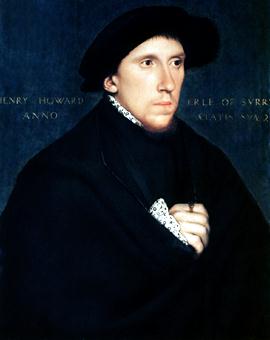 Henry Howard, Earl of Surrey by Hans Holbein
| ||
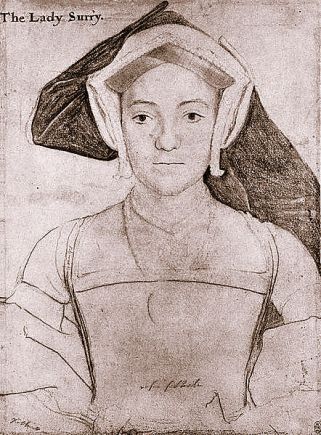 Henry's wife, Frances de Vere by Hans Holbein Frances de Vere and Henry Howard were betrothed when they were both 15. She does not appear to a large extent in the history of the time, perhaps being overshadowed by the circumstances revolving round the great family into which she had married. After Surrey was executed she was `relieved' of the upbringing of her children, their care being entrusted to the Duchess of Richmond [Mary Howard - wife of Henry Fitzroy]. They had five children, two sons, Thomas & Henry and 3 daughters, Catherine, Margaret & Jane. During the reign of Edward VI, Frances married Thomas Steyning/Staynings of Woodbridge and they lived at Earl Soham Lodge, in the neighbouring village to Framlingham. She died at Earl Soham in 1577 aged about 61 and was buried at Framlingham. | Subjects of his Poetry Surrey's name has been long connected with the 'Fair Geraldine', to whom his love poems were supposed to be addressed. 'Geraldine' was the daughter of the Earl of Kildare, Lady Elizabeth Fitzgerald, who was brought up at the English court in company with the Princess Elizabeth Tudor. She was ten years old when in 1537 Surrey addressed to her the sonnet 'From Tuskane came my ladies worthy tace', and nothing more than a passing admiration of the child and an imaginative anticipation of her beauty can be attributed to Surrey. A 'Song'... to a lady that refused to dance with him, is addressed to Anne Stanhope, Lady Hertford, wife of his bitter enemy (Edward Seymour); and the two poems are addressed to his wife, to whom, at any rate in his later years, he seems to have been sincerely attached. His poems, which were the occupation of the leisure moments of his short and crowded life, were first printed in 'Songs and Sonettes written by the ryght honorable Lorde Henry Howard late Earle of Surrey', and other (apud Richardum Tottel, f 557). A second edition followed in Jul 1557, and others in 1559, 1565, 1567, 5574, 1585 and 1587. Although Surreys name, probably because of his rank, stands first on the title-page, Thomas Wyatt was the earlier in point of time of Henrys courtly makers. Surrey, indeed, expressly acknowledges Wyatt as his master in poetry. As their poems appeared in one volume, long after the death of both, their names will always be closely associated. Wyatt possessed strong individuality, which found expression in rugged, forceful verse. Surrey contributions are distinguished by their impetuous eloquence and sweetness. * See Henry Howard's Poetry page | ||
"...it is a disgusting fact that the Duchess of Richmond [Howard's sister pictured right] was one of the witnesses against her father and her brother. ... The Duchess of Richmond declared that he had spoken with asperity of Hertford [[[Edward Seymour]]], to whom he attributed his late imprisonment ; that he had shown dislike to the new nobility ; had complained that the King expressed displeasure for the defeat at Boulogne in the preceding year; that he had dissuaded her from reading too far in the scriptures ; and that he had erected an altar in a church at Boulogne : but in the conclusion of her deposition, she maliciously insinuated that the earl had surmounted his arms instead of with a coronet, with what seemed to her much like a close crown, and a cipher which she took to be the king's cipher... [Source : The Aldine Edition of the British Poets; The Poems of Henry Howard, Earl of Surrey] The Duchess never remarried and her presence at court dwindled not long after Henry VIII died in January 1547. She, knowing how merciless her family was about power, and perhaps not wanting to be involved in another scandal, possibly chose to stay out of their plans in order to live a quiet life. She died in late 1557 aged about 38. | 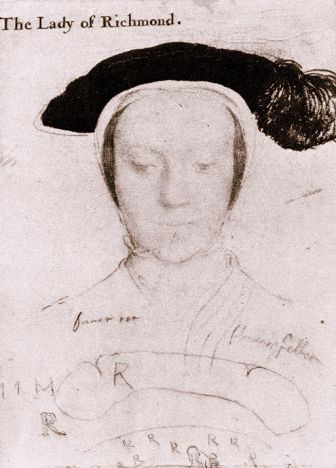 Mary Howard, Henry's older sister who became wife to Henry Fitzroy, Duke of Richmond, King's illegitimate son by Elizabeth Blount. - drawing by Hans Holbein | ||
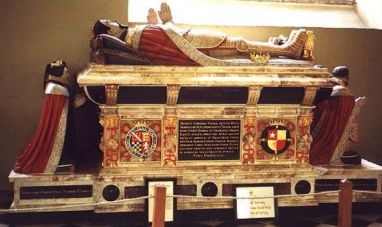 Following his execution in 1547, the Earl of Surrey's remains were buried at All 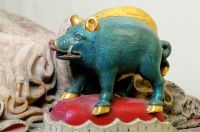 Hallows church in Tower Street , London . Before his own death in 1613 Henry Earl of Northampton , Surrey 's youngest son, made provision for his father's body to be removed to Framlingham and the present memorial erected in 1614. Hallows church in Tower Street , London . Before his own death in 1613 Henry Earl of Northampton , Surrey 's youngest son, made provision for his father's body to be removed to Framlingham and the present memorial erected in 1614. The effigies at the foot of the tomb represent, at Surrey 's feet, his sons, Thomas who became 4th Duke of Norfolk and at his side, Henry, Earl of Northampton . At their parents' head are the daughters, Jane, wearing a coronet, who became Countess of Westmoreland; in the centre Katherine, who married Henry Lord Berkeley; and Margaret, who married Henry Lord Scrope of Bolton . | LITERATURE:
| ||
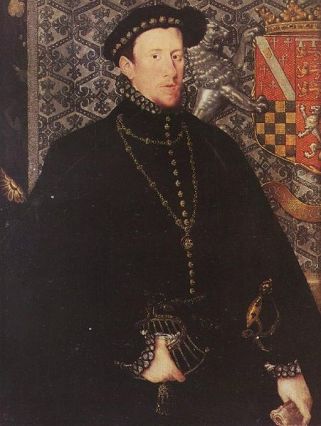 Thomas Howard, 4th Duke of Norfolk; son of Henry, Earl of Surrey and his wife. He was executed under his cousin, Elizabeth I. | 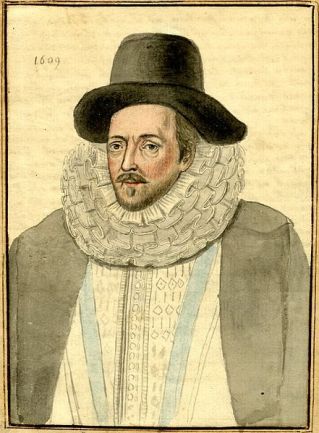 Henry Howard, Earl of Northampton; son of Henry, Earl of Surrey and his wife. |
